An Italian P-39
Introduction
Few aircraft have been wrongly saddled with a bad reputation as the Bell P-39 was. The USAAC hamstrung the airplane when it removed the turbocharger and clipped the wings. Then it sent poorly trained pilots to fight at altitudes the P-39 was not built for against Japanese Naval Pilots ( probably the best trained in the Pacific) flying with the best naval fighter at the time ( the A6M Zero). Is there any wonder why it did so-so? With all of that against it, it still fought to a 1:1 kill ratio. The Russians loved the P-39 and could not get enough of them. Most of the top-scoring allied aces got most if not all of their scores with the P-39. Like the F2A Buffalo, it depends on where and who flew it
The P-39 is fairly well represented in1/48th scale. The first kit was a 1/46th (?) scale kit by Revell. I have not seen this kit so I cannot comment on it. The next kit was the ahead-of-its-time Monogram kit of 1969. This kit is considered to be the first of the "super kits" where detail takes priority. Eduard burst on the scene with their first mainstream kit of the P-39. Almost any version of the P-39/P-400/Airacobra I can be built from this kit. Finally, Hasegawa came out with a nice P-39, but there are questions about its tail.
I was fortunate as Squadron had a clearance sale of Eduard Airacobra I Dual Combo kits, and I had just received an unexpectedly large bonus at work so I purchased a number of kits. I have built 11 Airacobras including 2 Monograms and 1 Hasegawa. So the question is which version will I build? The answer was a 4- bladed P-39. But the only confirmed 4-blade prop P-39 I had decals for was missing the sqn emblems for G.C.III/6.So the decals box was surveyed and the only "different" P-39 I had decals for was an Italian Co-Belligerent Air Force machine. So that was the "'Cobra" I did. Now I only need that elusive 4-bladed P-39Q, a Portuguese and RAAF P-39s to have one from every Air Force which used them.
The variant chosen is a P- 39N-1-BE serial number 42-9377. The serial number is important with P-39s as they look a lot alike and it is the only way of knowing which prop was installed. One needs to carefully choose the parts for the variant you are building. Check Hyperscale's Reference section as I seem to remember someone compiling a list of what parts to use for each version. Construction was straightforward with no major glitches. Bell had their own ideas about colors, and the interior was painted in Dull Dark Green, with the landing gear in either Medium Green or Dull dark green. Often the nose well was in Yellow Zinc Chromate, and the gear legs could be in Neutral Grey. As with all Eduard kits, you need to remove any excess plastic and paint from the mating surfaces. And follow the instructions. I needed a bit of filler here and there, where ( a lot of "ere"s) I was overzealous with trimming. Make sure you open up the holes you need to. Some have said the trailing edges of the wing are too thick, so the edges need to be thinned if it bothers you. When the kit was finished, and the seams were to my liking the kit was wiped off with Isopropyl Alcohol to clean it.
The Italian AF P-39s were painted in Olive Drab and Neutral Grey. This aircraft had yellow bands around the nose and tail. These were painted first and masked off. Vallejo colors were used, Neutral Grey and Dark Olive Drab 41. When dry, a coat of Future Floor Wax was added. The Eduard decals were then applied using the Microscale System, and the decals reacted well, snuggling down tight. Any excess glue and chemicals were removed with water and a soft rag. When dry a second coat of Future was applied. When the second coat of future had cured, a clear flat was sprayed on. I then attached the doors, canopy, prop, and remaining bits.
The model represents a Bell P-39N-1BE serial number 42-9377 coded 19 of the 97th Squadriglia, 9th Gruppo, 4th Stormo of the Italian Co-Belligerent Air Force in 1944. The Eduard P-39 is a nice kit that is not too fiddly and can be found fairly easily. It builds into a nice model, and the "Profipak" and dual Combo versions of the kit include masks, etched parts, and lots of decals. I can recommend this kit to everyone.
Bruce
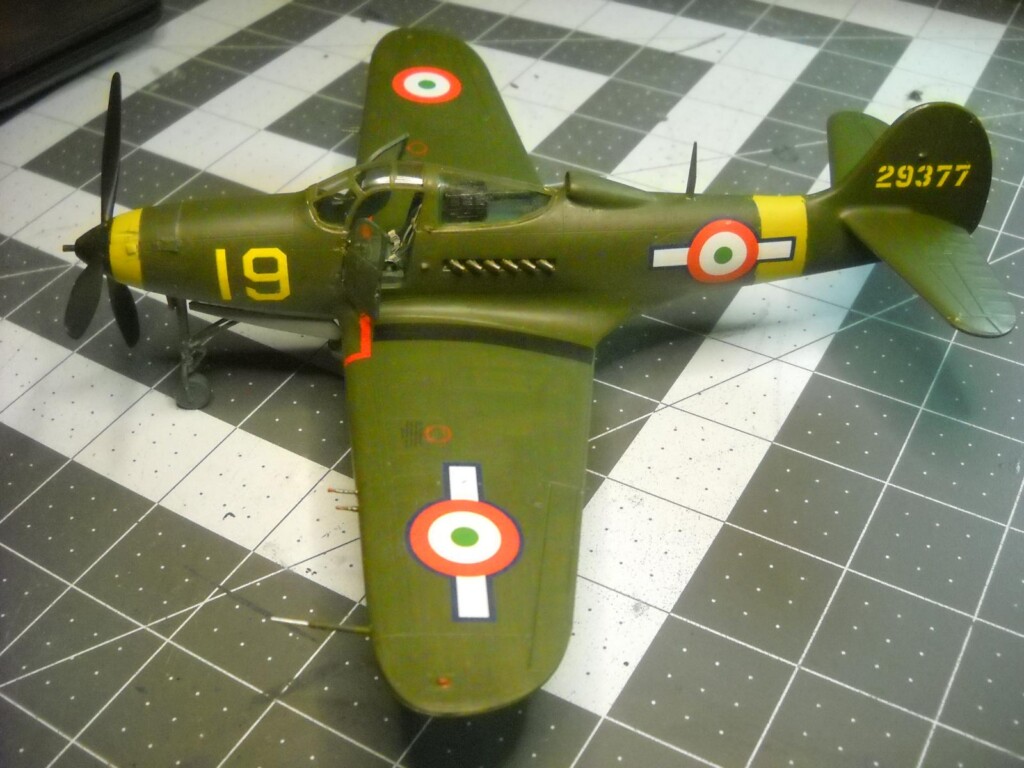
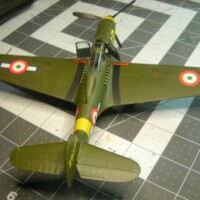
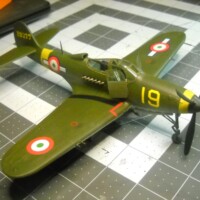
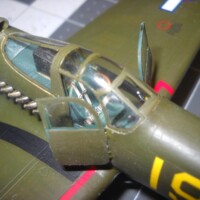
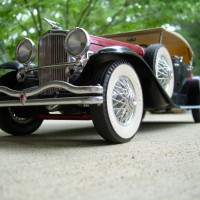
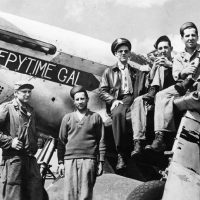
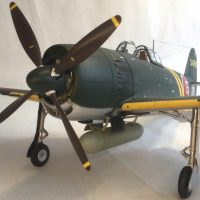
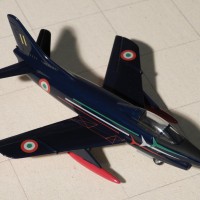
Great-looking P-39, Rob (@robertandy). Nice job getting enough weight in the nose to get it to sit on all three wheels.
Actually the weight was easy. I used the weight Eduard provided.
Excellent model and ditto article, Bruce!
Great looking Airacobra, Bruce @rbrucearcher
Not so often seen them build in Italian scheme, very nice.
Nicely done Bruce, never seen one with Italian markings. Only one American became an ace flying the P-39, 2Lt William Fiedler in the PTO. Tragically killed in a takeoff accident when a P-38 crashed into his awaiting P-39. Nice looking Airacobra, two thumbs up.
There are a couple of others who apparently shot down 5, but were not recognized. "Fibber" McGee of "Nips Nemesis" I and II was one.
The Airacobra is an attractive aircraft and your model really does it justice. The Italian version is great.
Great build and read Bruce Nice one
Nice one
Nicely done in a not too often livery.
Nice work on the P-39 Bruce. Eleven built, wow. I have one I built in 1980 (Monogram). It was one of the first kits I built as an adult. I still have it but it sits at the bottom of my shelf now. Yours looks like a top shelf item to me.
I am working on a 12th right now, a 4-bladed French P-39Q-21. A mechanic from the 35 Fighter Sqn 8th Fighter Group who told me lots of tales, some obviously tall ones about the P-39. And I began to like the "Cobra
Looks great! I'm in the middle of an ArmaHobby 1/72 Aircobra build - I do like the lines of this aircraft, and the fact that it wore several countries' liveries makes it a nice subject for me!
That does look great Bruce @rbrucearcher! And, I really like seeing it in a different livery. The only P-39 I've done is the Monogram version. It was posted here long ago:
And, I really like seeing it in a different livery. The only P-39 I've done is the Monogram version. It was posted here long ago: